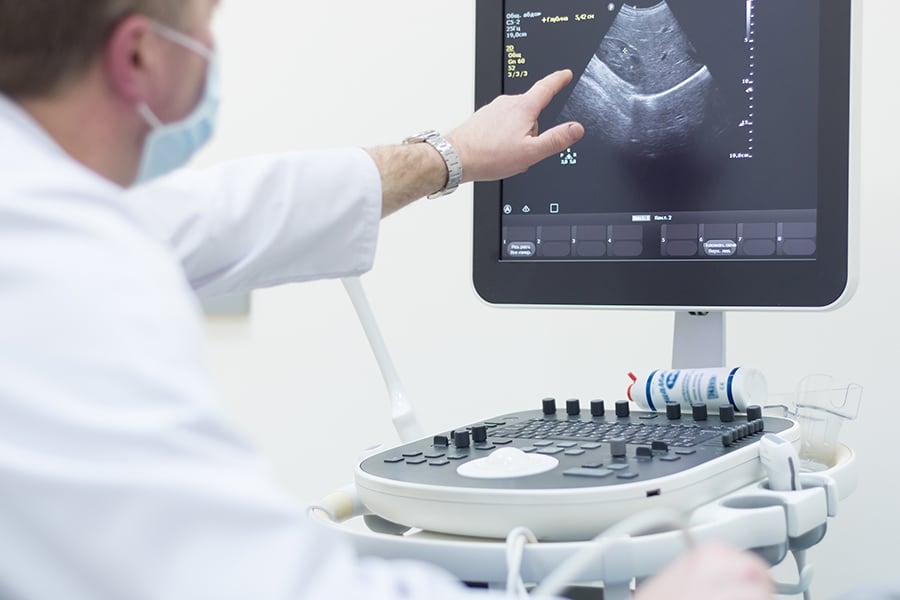
Getting pregnant is as magical as it is scary. From the horrible morning sickness to the joy that comes with experiencing the first kick, this part of your life is bound to evoke a myriad of emotions. Moreover, you have to take extra precautions and care, be it avoiding certain types of foods or getting ultrasounds.
In fact, ultrasounds are a standard for pregnancies since it's an effective and easy way to ensure you and your growing baby are both healthy. Typically, a pregnancy includes two standard ultrasounds to detect the development of your little one.
But if you're just becoming a mom, all of this will be new to you. Chances are, you have no clue about the number of ultrasounds necessary and when you should schedule them. Below we discuss when you should go for an ultrasound and what those will help you achieve:
Ultrasounds comprise the sending and detecting of sound waves. During an ultrasound, your OB-GYN, doctor, or an expert technician uses an innovative design referred to as the transducer to send high-frequency sound waves from your uterus.
These waves bounce back to the machine that converts the received signals into images of your growing baby. With the help of this, doctors can track the baby's development, scan the placenta, amniotic fluid, uterus, and pinpoint any possible genetic abnormalities.
Thankfully, ultrasounds use no radiations, whereas the used frequencies are risk-free. Your only concern will be that the gel feels cold upon coming in contact with your tummy. In healthy pregnancies, only two ultrasounds are necessary.
Typically, the first one is scheduled towards the end of the first trimester, aka when you reach the 11th or 14th week. The second one occurs between the 18th to 20th week.

Often referred to as the 'dating scan,' this ultrasound helps doctors spot any abnormalities, as well as analyze the gestational age of the developing child. Here your doctor will:
Your doctor will locate your growing baby's heartbeat to confirm whether you're pregnant or not.
During your 11th week, experts can measure the fetus. In turn, your doctor can find out either the gestational age or evaluate how far along you are. Both things help them calculate an appropriate due date.
Another thing your doctor can confirm by taking your ultrasound is the number of babies. If the scanning shows multiple fetuses, your doctor will be able to detect it and tell you.
An in-depth screening will help ensure your pregnancy is healthy and developing in the appropriate place. There's a slight chance the fertilized egg may attach itself outside the uterus, which ultrasound will help detect.
Nuchal translucency (NT) tests take place during the first trimester to check for Down syndrome, congenital heart diseases, and additional chromosomal abnormalities.
Moreover, your doctor will take a blood test to measure hormones and proteins. In addition, they'll measure the thickness of your developing child's neck.
The second-trimester ultrasound is otherwise referred to as 'Anatomy scan,' where the doctor examines the development of organs. They'll also check the position of the placenta. Here you can expect your doctor to:
Here your doctor can detect your baby's biological sex. In case you want to keep the baby's biological sex a surprise, inform your health professional to ensure they don't tell you.
While the first-trimester ultrasound helps detect genetic complications, the second one helps rule out any abnormalities in your child's anatomy. Your doctor will analyze their kidneys, heart, spine, face, brain, and limbs.
If your placenta’s position covers your cervix, it will obstruct the fetus's path during labor. In such instances, an obstetrician will recommend you to get additional ultrasounds.
Typically, a pregnancy requires no more than two ultrasounds. However, there are numerous reasons why you may have to take multiple ultrasounds.
For starters, there's a slight chance your first ultrasound takes place before reaching the 11 to 14-week mark. The reason being that intrauterine pregnancy starts showing by the 6th week, which means it allows doctors to evaluate how far along you are. In turn, you may have to take one during your 6th week, as well as between 11 to 14 weeks.

On the flip side, if your doctor detects any abnormalities or complications, you'll have to take additional ultrasounds. Be it the abnormal positioning of your placenta or the risk of a birth defect, it's vital to follow your doctor's orders to ensure a healthy pregnancy. Here's how you can reduce the risk factors:
In case of any weight, age, or medical risks, your medical assistant may recommend you to get weekly ultrasounds. It helps ensure the amniotic fluid, as well as the fetal movement, are completely healthy.
Generally speaking, ultrasound is safe and poses no threats. However, an ultrasound might heat up your tissues and allow the development of cavitation. But research has yet to discover the effects of heated tissues or cavitation.
Meaning while these are perfectly safe in a medical institution conducted on the basis of a prescription and practiced by an expert, you should avoid unprescribed ultrasounds.
Ultrasound exams are a vital part of pregnancy. Essential to make sure your baby is safe, the thought of additional checkups may leave you stressed or anxious. This is why it's always a good idea to talk about it with your doctor.
If you have any questions, concerns, apprehensions, unease, or worry about your fetus’ development contact your health care provider immediately.


ALL WARRANTIES OF ANY KIND WHATSOEVER EXPRESS, IMPLIED, AND STATUTORY, ARE HEREBY DISCLAIMED. ALL IMPLIED WARRANTIES OF MERCHANTABILITY AND FITNESS FOR A PARTICULAR PURPOSE ARE HEREBY DISCLAIMED. THE PRODUCTS SOLD, INCLUDING SONOGRAMS, ULTRASOUNDS, FAKE PREGNANCY DOCUMENTS, AND FAKE PREGNANCY TESTS ARE SOLD ‘AS IS’ BASIS.
THE SITE CANNOT AND DOES NOT CONTAIN [MEDICAL/ LEGAL/ FITNESS/ HEALTH/ OTHER] ADVICE. THE INFORMATION IS PROVIDED FOR PRANKS PURPOSES ONLY AND IS NOT A SUBSTITUTE FOR PROFESSIONAL ADVICE.
ACCORDINGLY, BEFORE TAKING ANY ACTIONS BASED UPON SUCH INFORMATION, WE ENCOURAGE YOU TO CONSULT WITH THE APPROPRIATE PROFESSIONALS. WE DO NOT PROVIDE ANY KIND OF MEDICAL/ LEGAL/ FITNESS/ HEALTH ADVICE. THE USE OR RELIANCE OF ANY INFORMATION CONTAINED ON THIS SITE, OR OUR MOBILE APPLICATION, IS SOLELY AT YOUR OWN RISK.
THIS WEBSITE DOES NOT PROVIDE MEDICAL ADVICE. THE INFORMATION, INCLUDING BUT NOT LIMITED TO, TEXT, GRAPHICS, IMAGES AND OTHER MATERIAL CONTAINED ON THIS WEBSITE ARE FOR PRANK PURPOSES ONLY. NO MATERIAL ON THIS SITE IS INTENDED TO BE A SUBSTITUTE FOR PROFESSIONAL MEDICAL ADVICE, DIAGNOSIS OR TREATMENT. ALWAYS SEEK THE ADVICE OF YOUR PHYSICIAN OR OTHER QUALIFIED HEALTH CARE PROVIDER WITH ANY QUESTIONS YOU MAY HAVE REGARDING A MEDICAL CONDITION OR TREATMENT AND BEFORE UNDERTAKING NEW HEALTH CARE REGIMEN, AND NEVER DISREGARD PROFESSIONAL MEDICAL ADVICE OR DELAY IN SEEKING IT BECAUSE OF SOMETHING YOU HAVE READ ON THIS WEBSITE.
THE PARTIES AGREE THAT ANY PRODUCT PURCHASED ON THE BABY MAYBE WEBSITE SHALL NOT BE USED FOR ANY PROPOSE OTHER THAN AS A PRANK. WITHOUT EXCEPTION NO BABY MAYBE PRODUCT SHALL BE PROVIDED/SUBMITTED TO ANY GOVERNMENTAL OR OTHER AGENCY, MEDICAL DOCTOR, ARBITER OF A DISPUTE, AS PROOF OF PREGNANCY, PAST OR CURRENT, OR TO CLAIM ANY BENEFIT FOR WHICH A PREGNANT WOMAN MAY BE ELIGIBLE, OR ENTITLED TO RECEIVE, BASED ON HER BEING PREGNANT. NO HIPAA PROTECTED PATIENT HEALTH INFORMATION CONNECTED TO ANY BABY MAYBE PRODUCT, IS INTENDED, OR CONVEYED, WITH RESPECT TO THIS SALE.
THE PARTIES AGREE THAT BABYMAYBE IS NOT RESPONSIBLE FOR ANY LIABILITY WHATSOEVER FOR DELAYS IN SHIPPING THE PRODUCT. THE PARTIES FURTHER AGREE THAT THE SOLE REMEDY FOR ANY SHIPPING DELAYS IS THE REFUND OF THE PURCHASER’S PAYMENT FOR THE PRODUCT.
THE PARTIES AGREE THAT THE FORUM FOR ANY LEGAL ACTION ASSOCIATED WITH THE SALE AND PURCHASE OF THE PRODUCT IS THE STATE OF ILLINOIS.